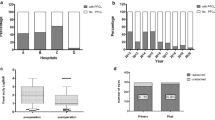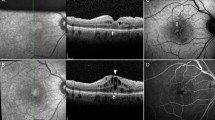Abstract
Purpose
To evaluate the safety and feasibility of perfluorocarbon-perfused vitrectomy (PCPV) as a technique during vitrectomy for proliferative diabetic retinopathy (PDR) and rhegmatogenous retinal detachment (RRD).
Methods
In an experimental, prospective, noncomparative and interventional study, 28 eyes of 28 patients were submitted to vitrectomy with the PCPV technique, 18 eyes with PDR and 10 with RRD. In this technique we replaced the traditional balanced saline solution (BSS) in the infusion line (conventional vitrectomy) by perfluorocarbon liquids (PCL). Some patients with PDR were treated with oxygenated PCL. Clinical evaluation, electroretinography (ERG), and endothelial cell count (ECC) were used to assess the safety of this procedure. An arbitrary grading system (grades 0–5) was used to classify the surgery and maneuvers to assess feasibility.
Results
No eyes had a significant decrease in ECC, and the patients in whom we could obtain ERG postoperatively showed no significant differences from preoperative ERG. In the PDR group (using oxygenated and nonoxygenated PCL), 77.8% were graded 5/5; in the RRD group 90% were 5/5. PCPV allowed better visualization of vitreous and intraocular structures, rapid retinal reattachment, less blood in the vitreous cavity, subretinal fluid resolution, blood confinement, retinal stabilization, and easier dissection of epiretinal membranes. In all cases at least one surgical step was eliminated.
Conclusions
PCPV in humans is a safe and feasible technique. Probably in selected cases the use of PCL offers several advantages over BSS, because of their properties (gravitational forces, immiscibility with bodily fluids, and ability to transport oxygen). Prospective and comparative studies are necessary to establish formal indications and possible contraindications.


Similar content being viewed by others
References
Blair NP, Baker DS, Rhode JP, Solomon M (1989) Vitreoperfusion. A new approach to ocular ischemia. Arch Ophthalmol 107:417–423
Blair NP (2000) Ocular oxygen consumption during vitreoperfusion in the cat. Trans Am Ophthalmol Soc 98:305–329
Berrocal MH, Chang S (1994) Perfluorocarbon liquids in vitreous surgery. Ophthalmol Clin North Am 7:67–76
Chang S (1987) Low viscosity liquid fluorochemicals in vitreous surgery. Am J Ophthalmol 103:38
Chang S, Zimmerman NJ, Iwamoto T, et al (1987) Experimental vitreous replacement with perfluorotributylamine. Am J Ophthalmol 103:29–37
Chang S, Ozmert E, Zimmerman NJ (1988) Intraoperative perfluorocarbon liquids in the management of proliferative vitreoretinopathy. Am J Ophthalmol 106:668–674
Chang S, Lincoff h Zimmerman NJ, Fuchs W (1989) Giant retinal tears: surgical techniques and results using perfluorocarbon liquids. Arch Ophthalmol 107:761–766
Charles S (2002) Vitreous microsurgery, 3rd edn. Lippincott Williams & Wilkins, Philadelphia, pp 18–39
Clark LC, Gollan F (1966) Survival of mammals breathing organic liquids equilibrated with oxygen at atmosphere pressure. Science 152:1755–1756
Clark LC Jr (1984) Methods of treating disorders of an eye with liquid perfluorocarbons. US Patent [407]4,490,351
Corcostegui B (1992) Use of perfluorocarbon liquid in vitrectomy for diabetic rhegmatogenous retinal detachment. J Vitr Retina 1:30–34
De Juan E Jr, McCuen B, Tiedeman J (1985) Intraocular tamponade and surface tension. Surv Ophthalmol 30:47–51
Desai UR, Peyman GA, Harper CA III, Alturki WA (1992)The use of Vitreon® in the removal of massive vitreous hemorrhage caused by perforating ocular trauma (abstract). Invest Ophthalmol Vis Sci 33 [Suppl]:1314
Desai UR, Peyman GA, Harper CA III (1993) Perfluorocarbons liquids in traumatic vitreous hemorrhage and retinal detachment. Ophthalmic Surg 24:537–541
Forlini C, Del Fiume E, Cicognani A, D’Eliseo D (1992) Use of PFCL in the surgical management of endophthalmitis: new indicators. J Vitr Retina 1:55–63
Gould SA, Rosen AL, Sehgal LR, et al (1986) Fluosol-DA as a red cell substitute in acute anemia. N Engl J Med 314:1653–1656
Greve MD, Peyman GA, Mehta NJ, Millsap CM (1993) Use of perfluoperhydrophenanthrene in the management of posteriorly dislocated crystalline and intraocular lenses. Ophthalmic Surg 24:593–597
Haidt SJ, Clark LC Jr, Ginsberg J (1982) Liquid perfluorocarbon replacement of the eye (abstract). Invest Ophthalmol Vis Sci 22 [Suppl]:233
Heimann K (1993) Combined intraocular PFCL plus silicone oil tamponade for control of intraoperative hemorrhages (sandwich technique). Vitreoretinal Surg Technol 5:8
Lambert HM, Capone A Jr, Aaberg TM, et al (1992) Surgical excision of subfoveal neovascular membranes in age-related macular degeneration. Am J Ophthalmol 113:257–262
Liu KR, Peyman GA, Chen M, Cheng K (1991) Use of high density vitreous substitutes in the removal of posteriorly lenses or intraocular lenses. Ophthalmology 22:503–507
Machemer R, Buettner H, Norton EWD, et al (1971) Vitrectomy: a pars plana approach. Trans Am Acad Ophthalmol Otolaryngol 75(4):813–820
McDonagh P, Cerney K, Hokama J, et al (2001) Perflubron emulsion reduces inflammation during extracorporeal circulation. J Surg Res 99:7–16
Millsap CM, Peyman GA, Ma PE, Greve MDJ (1994) The surgical management of retinopathy of prematurity using a perfluorocarbon liquid. Int Ophthalmol 18:97–100
Nabih M, Peyman GA, Clark LC Jr, et al (1989) Experimental evaluation of perfluorophenanthrene as a high specific gravity vitreous substitute: a preliminary report. Ophthalmic Surg 20:286
Nakstad B, Wolfson MR, Shaffer TH, et al (2001) Perfluorochemical liquids modulate cell-mediated inflammatory responses. Crit Care Med 29:1731–1737
O’Malley C, Heintz RM (1972) Vitrectomy via the pars plana—a new instrument system. Trans Pac Coast Oto-Ophthalmol Soc 53:121–137
Opremcak EM, Bruce RA (1999) Surgical decompression of branch retinal vein occlusion via arteriovenous crossing sheatotomy. Retina 19:1–5
Opremcak E, Opremcak EM, Bruce RA, Lomeo MD, Ridenour CD, Letson AD, Rehmar AJ (2001) Radial optic neurotomy for central vein occlusion: a prospective pilot study of 11 consecutive cases. Retina 21(5):408–415
Osterloh MD, Charles S (1988) Surgical decompression of branch retinal vein occlusions. Arch Ophthalmol 106:1469–1471
Parel JM, Machemer R, Aumayr W (1974) A new concept for vitreous surgery. Improvements in instrumentation and illumination. Am J Ophthalmol 77(1):6–12
Peyman GA, Schulman JA (1986) Intravitreal surgery: principles and practice. CT Appleton Century-Crofts, Norwalk, p 384
Quiroz-Mercado H, Suarez-Tatá L, Magdalenic R, Murillo-López S, García-Aguirre G, Guerrero-Naranjo J, Rodríguez-Reyes A (2004) Perfluorocarbon perfused vitrectomy: animal studies. Am J Ophthalmol 137(2):287–293
Quiroz H (1998) Vitrectomy and erbium-Yag laser retinochoroidal shunts for the treatment of central vein occlusion. Retina Society 31st Annual Scientific Meeting. Washington D.C., September 24–27
Resnick KI, Shapiro MJ, Kim S (1991) Perfluorooctane as an instrument to manipulate intraocular foreign bodies (abstract). Invest Ophthalmol Vis Sci 32(suppl):881
Shaffer TH, Wolfson MR, Clark LC Jr (1992) State of the art review: liquid ventilation. Pediatr Pulmonol 14:102–109
Spiess BD, Cochran RP (1996) Perfluorocarbon emulsion and cardiopulmonary bypass: a technique for the future. J Cardiothorac Vasc Anesth 10:83–90
Suarez Tatá L, Quiroz-Mercado H, Murillo S, et al (2002) Inflammatory reaction after vitrectomy with perfluorocarbons vs. saline solution in experimental endophthalmitis. Rev Soc Mex Ophthalmol 76:178–183
Velikay M, Stolba U, Wedrich A, Li Y, Datlinger P, Binder S (1995) The effect of chemical stability and purification of perfluorocarbon liquids in experimental extended-term vitreous substitution. Graefes Arch Clin Exp Ophthalmol 233:26–30
Velikay M, Wedrich A, Stolba U, Datlinger P, Li Y, Binder S (1993) Experimental long-term vitreous replacement with purified and nonpurified perfluorodecalin. Am J Ophthalmol 116:565–570
Van Effenterre G, Le Mer Y, Lacotte JL, Ameline B (1992) Luxation posterieure du cristallin ou d’un implant: traitment chirurgical utilisant un perfluorocarbone liquide. J Fr Ophtalmol 15:337–342
Wilson CA, Berkowitz BA, Srebro R (1995) Perfluorinated organic liquid as an intraocular oxygen reservoir for the ischemic retina. Invest Ophthalmol Vis Sci 36:131–141
Wilson CA, Berkowitz BA, McCuen BW, Charles HC (1992) Measurement of preretinal oxygen tension in the vitrectomized human eye using fluorine-19 magnetic resonance spectroscopy. Arch Ophthalmol 110:1098–1100
Wong D, Lois N (2000) Perfluorocarbons and semifluorinated alkanes. Semin Ophthalmol 15:25–35
Zimmerman NJ, Faris D (1984) The use of N-perfluorocarbon amines in complicated retinal detachments (abstract). Invest Ophthalmol Vis Sci 25 [Suppl]:258
Author information
Authors and Affiliations
Corresponding author
Additional information
Presented in part at the Jules Gonin Meeting, 2 September 2002, in Montreux, Switzerland.
The authors have no proprietary interest in any aspect of this report.
Rights and permissions
About this article
Cite this article
Quiroz-Mercado, H., Guerrero-Naranjo, J., Agurto-Rivera, R. et al. Perfluorocarbon-perfused vitrectomy: a new method for vitrectomy—a safety and feasibility study. Graefe's Arch Clin Exp Ophthalmol 243, 551–562 (2005). https://doi.org/10.1007/s00417-004-1063-z
Received:
Revised:
Accepted:
Published:
Issue Date:
DOI: https://doi.org/10.1007/s00417-004-1063-z




